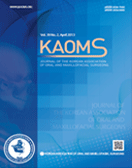Journal of the Korean Association of Oral and Maxillofacial Surgeons
- P-ISSN2234-7550
- E-ISSN2234-5930
- SCOPUS, KCI, ESCI
 ISSN : 2234-7550
ISSN : 2234-7550
Risk factors of medication-related osteonecrosis of the jaw: a retrospective study in a Turkish subpopulation
Onur Odabaşı (Ankara Yıldırım Beyazıt University, Ankara)
Toghrul Aliyev (İzmir Katip Çelebi University, İzmir)
Birkan Tatar (İzmir Katip Çelebi University, İzmir)
Abstract
Objectives: Medication-related osteonecrosis of the jaw (MRONJ) is a well-known side effect of certain drugs that are used to influence bone metabolism to treat osteometabolic disease or cancers. The purpose of our study was to investigate how high-concentration and low-concentration bisphosphonate (BP) intake affects the disease severity. Materials and Methods: Data collected from the medical records of 52 patients treated with BPs, antiresorptive, antiangiogenic drugs and diagnosed with MRONJ were included in this study. Age, sex, type of systemic disease, type of drug, duration of drug treatment, jaw area with MRONJ, drug administration protocol, and MRONJ clinical and radiological findings were obtained. Patients were divided into two groups: anti-neoplastic (Group I, n=23) and anti-osteoporotic (Group II, n=29). Statistical evaluations were performed using the IBM SPSS ver. 21.0 program. Results: In both groups, more females had MRONJ. MRONJ was found in the mandibles of 30 patients (Group I, n=14; Group II, n=16). When we classified patients according to the American Association of Oral and Maxillofacial Surgeons staging system, significant differences were seen between groups (χ2=12.23, P<0.01). More patients with advanced stage (stage 2-3) MRONJ were found in Group I (60.9%). Conclusion: According to our results, high-concentration BP intake, age and duration of drug intake increased disease severity.
- keywords
- Bisphosphonate-associated osteonecrosis of the jaw, Osteonecrosis, Risk factors, Zoledronic acid
- 다운로드 수
- 조회수
- 0KCI 피인용수
- 0WOS 피인용수